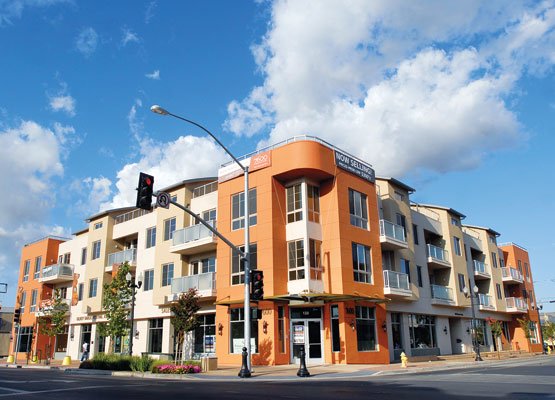The Garlic Festival Association is the latest casualty of the
real estate market.
The Garlic Festival Association is the latest casualty of the real estate market.
Last week the association’s board of directors voted unanimously to stop making payments on the $8.8 million loan it took out with its partner, Pleasant Valley Development Group, to finance the four-story stucco commercial and residential building at 7600 Monterey Street. Pleasant Valley is registered to Randy Moen, the president of Tanglewood Construction, which built the downtown structure.
The association and Pleasant Valley teamed up to form 7600 Monterey Associates, but the collective company did not receive one written offer for any of the 24 condos since they and separate first-floor commercial spaces went on sale in June. The partnership submitted a written notice to South Valley National Bank last Thursday, according to Garlic Festival Association Executive Director Brian Bowe.
“The real question was the bigger picture, looking down the road a couple of years and seeing how deeply we would’ve had to go into the festival’s reserves to sustain this project,” Bowe said. “It didn’t make any sense to spend down the festival reserves to keep this building going. The whole point from the start was to keep this building and the festival separate and to protect the future of the festival.”
The festival has already lost $1.04 million. That money came from the sale of the festival’s old office space across the street as well as the parking lot behind that space. It then supplemented this cash with about $200,000 from its general fund and another $200,000 from its reserve fund, according to Bowe. The Pleasant Valley Development Group – the festival’s 50-50 partner – has incurred an identical loss of $1.04 million, Bowe said. Despite the hit, the association still has more than $850,000 in reserves, so residents have no reason to worry about the festival’s future, Bowe said.
“Our reserve fund is still very healthy, and that’s what we wanted to continue,” Bowe said. “The board voted to protect the future of the festival.”
Eleanor Villareal has volunteered in Gourmet Alley for the past 30 years and agreed with the decision to protect the reserve fund.
“If they dig too much into those reserves, they won’t be able to put on the festival,” Villareal said. “I feel bad about it, but it’s just bad timing.”
2008 Garlic Festival President Ed Struzik, who will step down Nov. 1 to serve as past president on the 2009 next board, described last week’s vote as “very emotional,” but he said everybody still stands behind the 2005 board’s decision to approve the real estate project.
“No one would change their vote,” Struzik said. “It’s an anchor building downtown, and we can always look to it and be proud.”
Mayor Al Pinheiro agreed.
“The Garlic Festival was doing the right thing when they put this together. I’m very sorry to see this happen, but they’ve left a legacy there at that corner,” Pinheiro said. “I hope to God they’re able as an organization to stay in that building.”
Two weeks ago, the festival signed a five year lease for its first-floor space in the building with 7600 Monterey Associates, and Bowe said the festival plans to remain in the building that will eventually enliven downtown once the market turns around.
“We will always be proud of this building and this commitment to the community,” Bowe said.
While some residents have decried the festival’s decision to play the real estate market, downtown developer Gary Walton encouraged a long-term view while also sympathizing with the festival.
“If you look at downtown with a long term view, a hiccup here or there is not the end of the world. The Garlic Festival board is not responsible for the current market conditions, nor do they have any power to change them,” Walton wrote in an e-mail. “I sympathize with the Garlic Festival board, it had to be a hard decision to throw in the towel, but I commend them for at least trying to help revitalize downtown by making the substantial investment of time and money to accomplish what they did.”
Bank representatives did not return calls last week, and the business was closed Monday, but Bowe said the terms of the non-recourse loan meant the lender could not liquidate the festival and had to take the building as collateral. What it will decide to do, though, remains to be seen.
“I can’t speak for the bank, but I imagine this is one difficult issue on a stack of difficult issues for them,” Bowe said.
Renting the condominiums instead of selling them for about $300,000 was not an option either, Bowe said, because that would have left the festival in the red.
Bowe came on board in February 2006, six months after the association’s nine-member board of directors voted 6-0 – with one abstention and two members absent – to approve the construction of a new office with residential and retail components. Then-Director Jeff Martin abstained because he represented the festival and Tanglewood in his pursuit to fulfill former Executive Director Richard Nicholls’ vision for the new building.
The board of directors, led by then-President Jennifer Speno, spent months debating whether the residential element was a good idea. There were some slight skeptics who initially called for more prudence, but then the group studied the idea, consulted with lawyers and took pains to make sure the funds for the condominium venture would not take any money away from the charities, said Speno and several former board members.
All this risk has been much appreciated by the city, which omitted certain development fees for the downtown project, and people such as Pinheiro who have tried for the past several years to see downtown into a new era. The city council will hold a study session on downtown revitalization Oct. 20.














